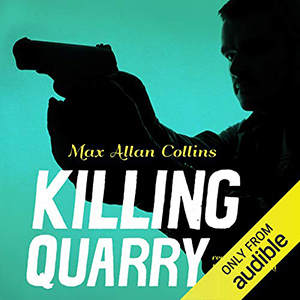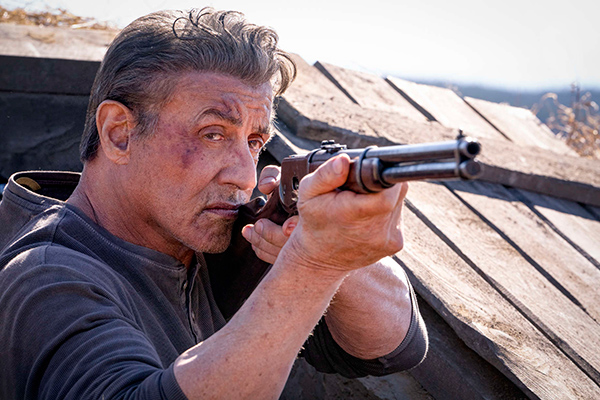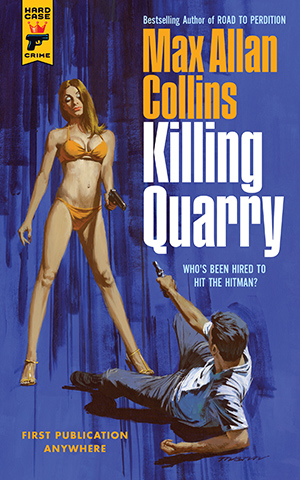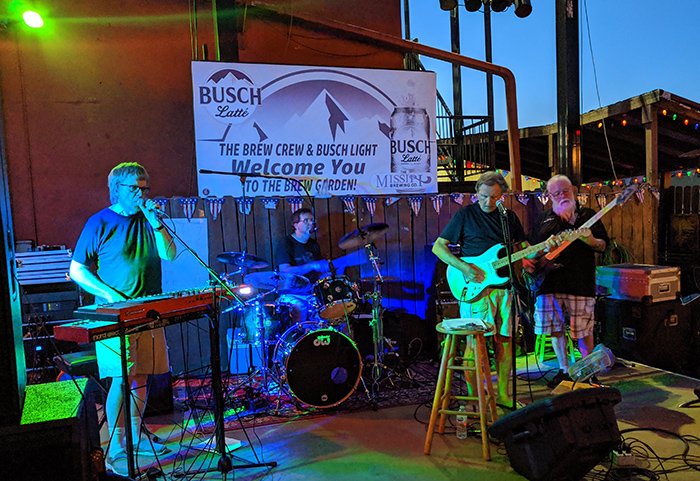I have a whopping 15 advance copies of Killing Quarry (the book will be on the stands in November).
A number of you were nice enough to volunteer to review pretty much anything of mine, when I went on a recent self-pity binge. I am going to ask you a favor, because it will help me get these books out to you. Go ahead and enter this giveaway, even though not long ago you sent me info; it will make things move quicker. Here are the rules.
Write me at macphilms@hotmail.com. You agree to write a review for Amazon, Barnes & Noble or your own blog or review site (if you hate the book, you are released from this commitment, but can review it anyway if you wish). USA addresses only. It’s important that you send your snail-mail address. Also, if you’re one of the kind people who volunteered to review my stuff recently, remind me of that.
These are ARCs (Advance Reading Copies) but they are identical to the coming trade edition – I had made my corrections and revisions beforehand. I would be glad to sign and personalize your copy if you request it.
Thank you for your interest and support. A Girl Can’t Help It giveaway will follow in January or February.
* * *
Rambo: Last Blood has a 27% critical score on Rotten Tomatoes. That was almost enough to scare me off, until I noticed the audience score was 82%. Somewhere there’s a disconnect.
I decided to check out the negative reviews, and here’s a typical excerpt: “…less an escapist action movie and more a dramatized manifestation of the most notorious sentences from Donald Trump’s presidential campaign announcement speech (Matthew Rozsa).” This political, politically correct tone infected most of the negative reviews on view at Rotten Tomatoes.
Also, I read that the author of First Blood, David Morrell, had given his thumbs down to the film. More about that later.
I hardly ever talk politics here. Most people familiar with me and my work know that I am a left-of-center individual. But I have friends and business associates who have different views, and having damaged some friendships over this nonsense, I now try to keep my opinions to myself. I mention this only because I liked Rambo: Last Blood very much, as did my equally (maybe more) liberal wife.
Before I get into that film itself, let’s revisit the first four Rambo films, briefly (my wife and I watched them, one a night, after seeing the new one).
First Blood (1982) is the best film, a fairly faithful rendering of Morrell’s fine first novel (again, more about this later). It is set stateside and deals with both PTSD and smalltown prejudice against long-haired apparent hippies (a brilliant mix) and is a rousing action film that builds and builds to an emotional outburst from the taciturn Rambo about the rage in him and what fueled it.
Rambo: Second Blood (1985) is a fun action film, fast-paced and impressive in what it pulls off without CGI. This is where Rambo becomes iconic in the way Mike Hammer and Tarzan are iconic. A structure that would follow all of the coming films to at least some degree has (act one) Rambo reluctantly getting involved in a mission, (act two) Rambo playing cat-and-mouse games with his pursuers in a jungle setting, and (act three) Rambo kicking ass in a large-scale battle sequence. This really is the Morrell structure moved from America to Vietnam, with Afghanistan, Burma and Mexico substituting in subsequent entries.
Rambo III (1988) is pretty much the same movie as the second one, but bigger and with a few variables – Rambo is captured and tortured in the previous film, but this time his commander – played by the always dependable Richard Crenna – gets the torture routine. The difference is the stoic Rambo, when he does speak, utters quips right out of the Schwarzenegger playbook – this, for instance, is the one where Rambo tells the bad guy, “I’m your worst nightmare.”
All of these movies benefit from rousing Jerry Goldsmith scores that invoke John Barry’s Bond themes.
Rambo (2008), which is also known as John Rambo and was at one point actually called First Blood, comes about twenty years later and manages to be anti-war even as it bathes the screen in blood. It’s fast, entertaining and gritty, and the CGI ups the ante (although I am not a fan of computer-generated blood).
Now let’s talk the current movie, the fifth Rambo, called simply that. I am going to do a plot summary, so skip the next three paragraphs if you’re spoiler sensitive.
John Rambo is on his Arizona ranch where he rides horses when he isn’t obsessively digging tunnels and almost subconsciously preparing for a battle that may never come. His Hispanic housekeeper, with whom he has a warm mother/son relationship, has a teenaged daughter to whom Rambo has been something of a surrogate father. The girl is obsessed with facing her actual father, who deserted her and her mother, years ago; he’s in Mexico and it’s made clear that Rambo cleaned this abusive a-hole’s clock but good, once upon a time.
The girl winds up in Mexico, rejected by Daddy, then roofied and dragged into forced prostitution. Rambo goes looking for her and gets his expected torture scene – this is roughly act one of the usual structure, as earlier Rambo tried hard to talk the girl into not going looking for her despicable old man. After being rescued by an undercover female reporter, who gives him first aid and information, Rambo then goes back to rescue the girl.
This leads to mayhem (act two, minus the cat-and-mouse stuff) as he makes the rescue. But the brutalized and now dope-addicted girl dies on the way home. Rambo, having killed the number two bad guy, goes home and sends his housekeeper away and preps for war with bad guy number one and his minions. Act three is the big battle scene as the bad guys attack, like Apaches on a fort manned by a single brave soldier; and here an underground cat-and-mouse game finds its home within the larger battle.
Throughout this fifth film, Rambo is shown to still be suffering from PTSD, for which he takes (and eventually abandons) medication. A smaller film than the preceding Burma chapter, number five is a solid entry and employs some of the most startling deaths this side of an Evil Dead movie.
And that similarity made me reflect on why the Rambo films entertain – it’s, in part, because they invoke several genres all at once. Rambo is Tarzan, master of the jungle and jungle tactics. Rambo is Mike Hammer, taking vengeance (the main bad guy always gets it good). Rambo is John Wayne – in the current film, he’s specifically the surrogate father of The Searchers– with horseback action heavy in numbers three and five.
But this new film makes it clear, too, that every Rambo is an inverted horror film of the slasher variety – he is Jason or Michael Myers as the hero, stalking and killing and sometimes in a shockingly amusing fashion. Stallone is a master at talking to all our worst but also best instincts – family is important in these films, loyalty and friendship (another Hammer quality), even compassion.
If Rambo (2019) is a smaller film than the preceding entry, and perhaps not quite as epic as what would appear to be the final chapter might be, it’s a terrific action movie, well-executed with a legendary, charismatic star at its center.
What has made many of my fellow liberals, particularly those farther left than yours truly, go apoplectic, is that the bad guys are Mexicans. They ignore an obvious fact: so are most of the good guys – the Hispanic daughter, her grandmother, a doctor who tends to Rambo, the female journalist who helps him and whose own sister went down the same horrifying path as Rambo’s surrogate daughter. Idiots who see the shot of the Trump border fence (actually erected under Obama) see proof that this film is one big red MAGA hat. They don’t notice that the next shot shows Mexican bad guys coming out of a tunnel under that “big beautiful wall,” delivering them in the good ol’ USA.
The reviewers, whose gentle sensibilities have been ruffled by a straight-forward revenge melodrama, seem convinced this film was designed to pander to Trump lovers. I just watched the special features on the previous Rambo movie – the one that came out in 2007 – where in the “making of” documentary, Stallone tells the story of the film to come – Rambo back in Arizona, with the surrogate daughter who goes to Mexico and gets kidnapped into prostitution. This would have been conceived around 2005 – uh, Trump wasn’t president then, was he? I forget. Yet I do recall the review I quoted that insisted the film was inspired by Trump’s campaign announcement speech.
Why does Dave Morrell hate the new film? He has said it left him feeling “degraded and dehumanized.” I understand the complicated feelings writers have about their work being adapted to the screen. I also understand how frustrating it is to be left out of the creative process (Rambo’s creator had some early talks with Stallone about the story, but they stopped in 2016). When my Quarry was adapted for Cinemax, the most distinctive aspect of the character – his dark sense of humor – was largely gone. But I got over it. Well, I cashed the check.
I’m not a close friend of Dave’s, but we’re friendly acquaintances who shared a mentor in Don Westlake. Dave taught at Iowa City and I used to run into him now and then; we would talk, mostly about Westlake.
One memorable encounter between us in Iowa City, at a bookstore – Prairie Lights, I believe – we have both written about. He had been offered the novelization job for Rambo II and was uneasy about accepting it. Here’s his version from his website:
I killed Rambo (in the novel First Blood), and now in the novelizations he would be alive. The logic really bothered me. One day, I crossed paths with my writer friend, Max Allan Collins (among other things, he wrote the wonderful graphic novel, Road to Perdition), who said that the problem was easily solved. “Just add an author’s note,” he told me, “in which you say something like, ‘In my novel First Blood, Rambo died. In the films, he lives.’” So that’s what I did.
Two other ironies or at least odd resonances occur to me. First, I had not written any novelizations yet when I suggested Dave ought to take that gig. Second, the next time I ran into him, he was doing a book signing at B. Dalton in an Iowa City mall, and Barb and I were on our way to see Rambo II in that mall’s theater. I believe he was signing the novelization, and I think he signed one to me, but I’ll be damned if I know what became of it.
Dave and I have a bond. We created (as best we can tell) the first two Vietnam vet PTSD anti-heroes in Rambo and Quarry. And we both based those heroes, at least in part, on Audie Murphy.
Here’s what I know about David Morrell: he is a great guy and a great writer. I respect his opinion on the latest Rambo film, and hope he will tolerate mine.
* * *
Check out this amazing podcast largely about Quarry, and specifically about Quarry’s Choice. The reviewer (there are two, both of whom like the Quarry character, one a huge fan) puts Quarry and me in a pantheon of three, the others being Richard Stark and Parker, and Donald Hamilton and Matt Helm. I admit to be blown away by being compared to these greats.
Here’s a fun You Tube review of Ms. Tree: One Mean Mother.
The excellent True West magazine gives me a nice boost for Last Stage to Hell Junction in their current issues and on their website.
Finally, here’s a terrific review of Scarface and the Untouchable…from a gun enthusiast!
M.A.C.












